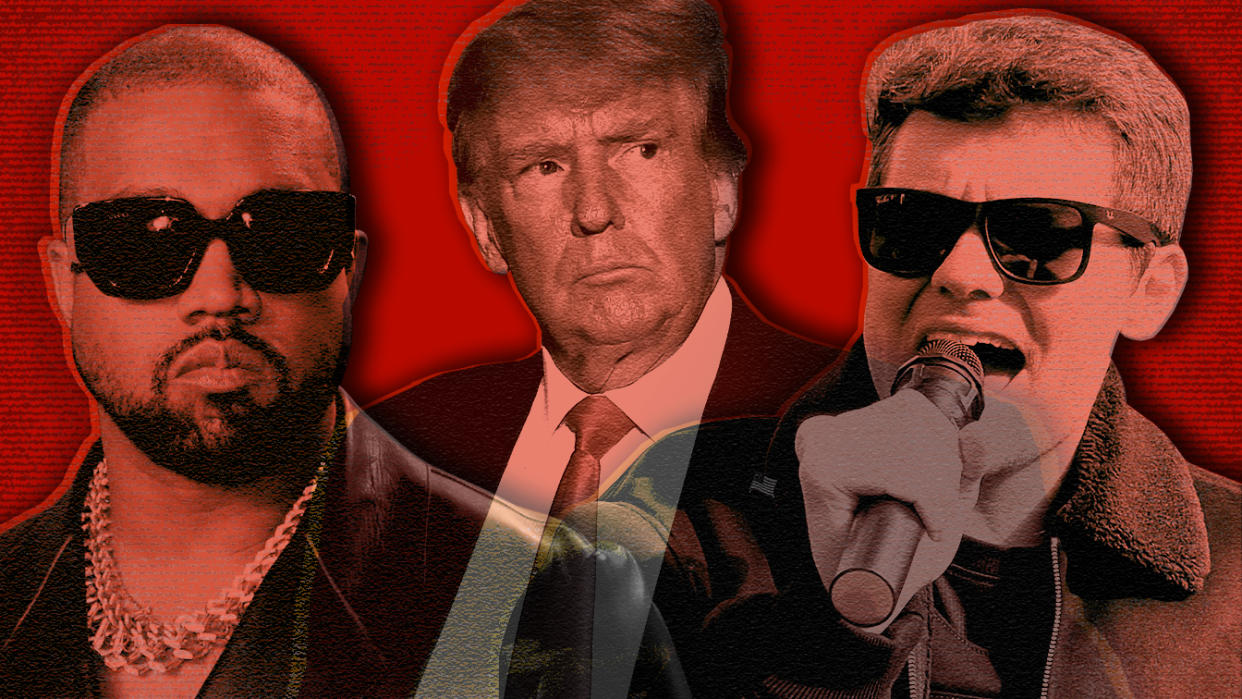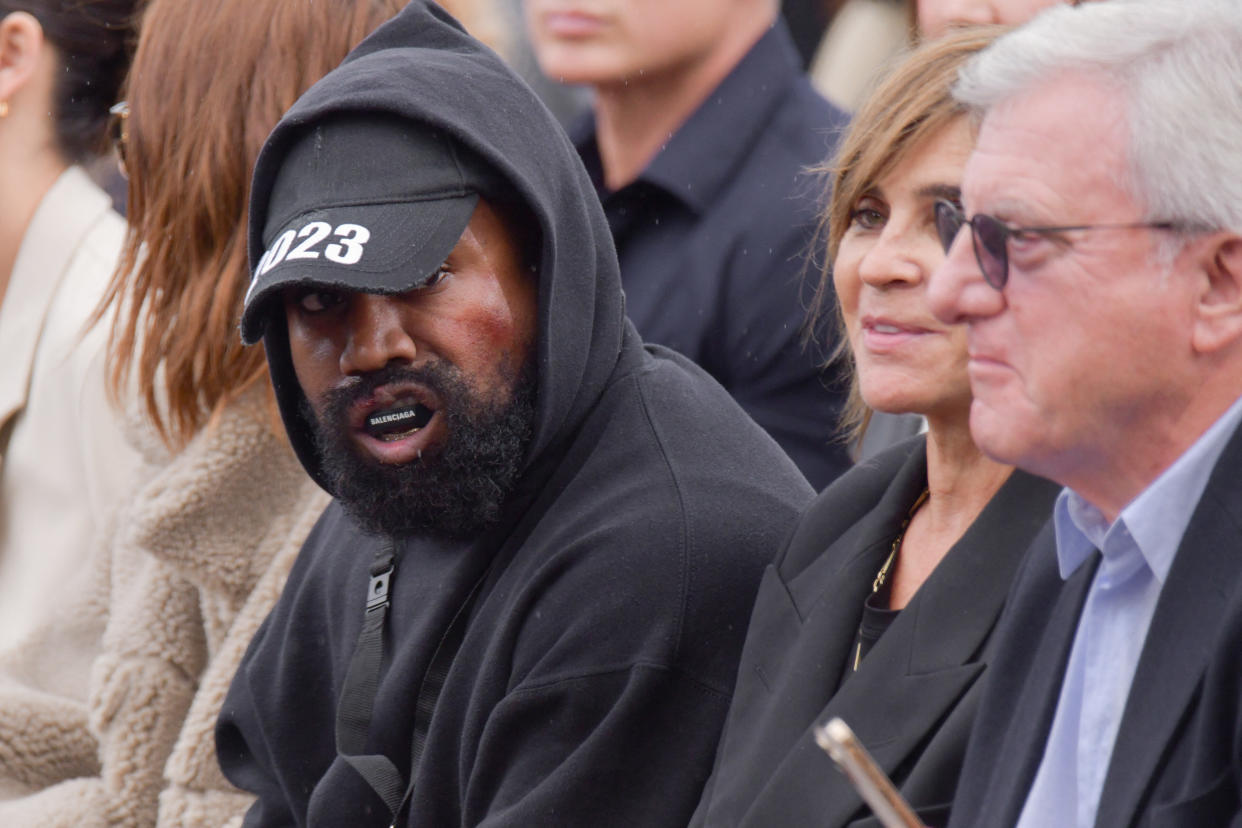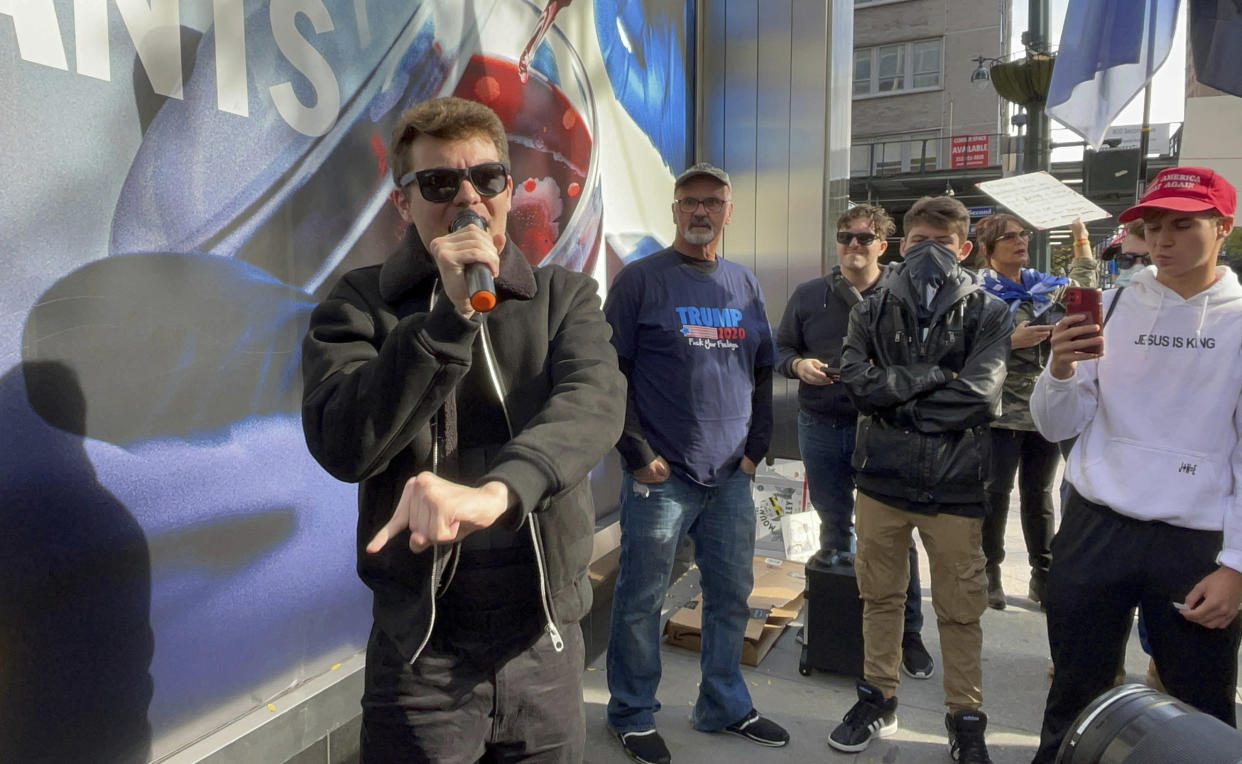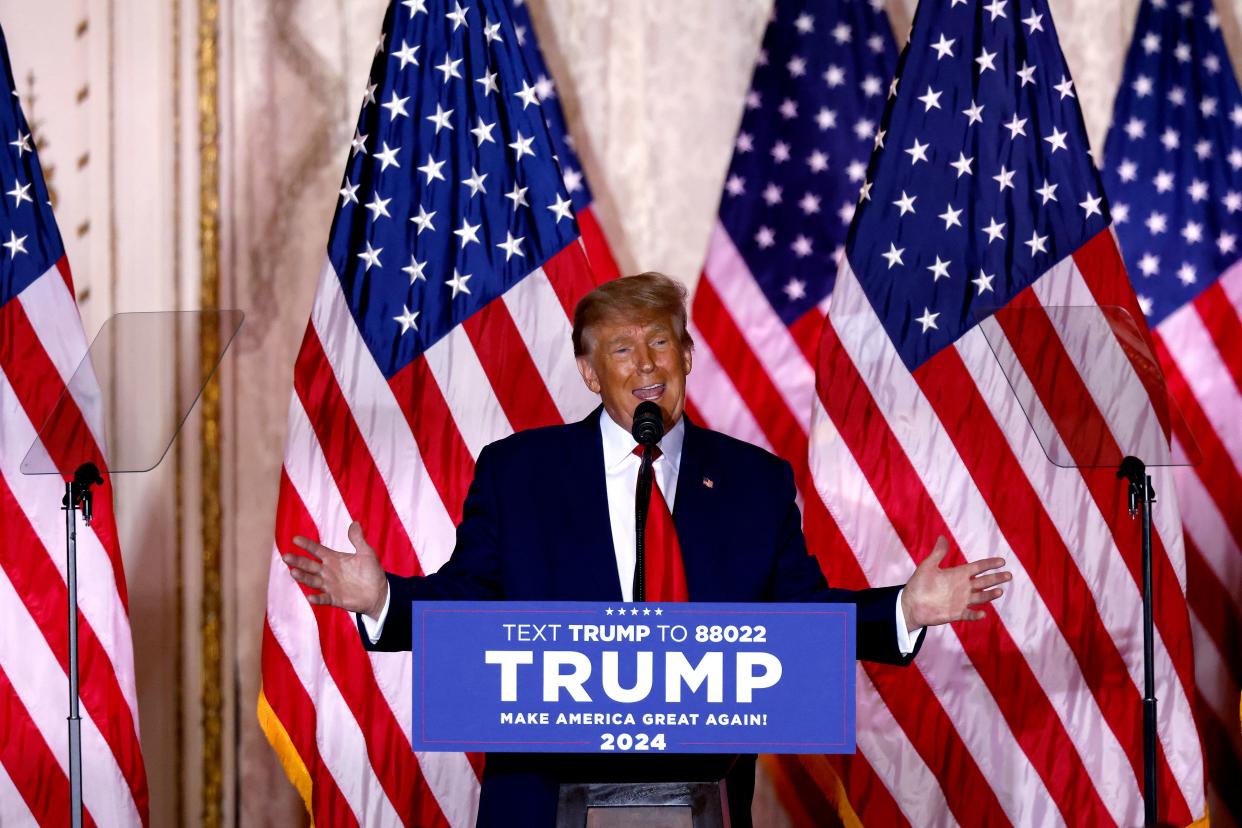Poll: Trump loses ground with Republicans after Kanye West, Nick Fuentes dinner

A new Yahoo News/YouGov poll shows that a plurality of Americans (41%) disapprove of Donald Trump’s decision to host a private, pre-Thanksgiving dinner at his Mar-a-Lago estate with the openly antisemitic rapper Kanye West, also known as Ye, and “his associates,” while almost as high a percentage (36%) say they're not sure what to think.
But the more Americans learn about the dinner, the worse things start to look for Trump — especially among Republicans.
For more than a week, the former president’s controversial soirée has dominated U.S. political news, triggering widespread condemnation from both the left and the right and prompting political observers to ask whether Trump’s latest offense will damage his recently announced comeback bid for the 2024 GOP presidential nomination.
At first glance, the new Yahoo News/YouGov survey of 1,635 U.S. adults, which was conducted from Dec. 1 to Dec. 5, would seem to suggest a rather muted effect, with nearly as many respondents expressing uncertainty as disapproval — and a not-insignificant minority (23%) initially going so far as to say they approve of the dinner.

Dig deeper, however, and the results paint a more troubling picture for the former president.
Immediately after asking whether they “approve or disapprove” of Trump’s “decision to host “Kanye West at Mar-a-Lago for a Thanksgiving dinner” — with no additional information provided about West or his entourage — the poll goes on to summarize West’s recent remarks about Jews:
Kanye West recently tweeted that he was "going death con 3 on JEWISH PEOPLE" because they have "toyed" with him and "tried to black ball anyone who opposes [their] agenda." He went on to blame "Jewish media" and "Jewish Zionists" for "own[ing] the Black voice," adding that "the Jewish community, especially in the music industry...they’ll take us and milk us till we die."

When asked if they would “characterize these remarks as antisemitic,” a full two-thirds of Americans (66%) said yes, while just 11% said no. Roughly a quarter (23%) were not sure. And while the left is more willing than the right to answer in the affirmative, overwhelming majorities of Democrats (76%) and Joe Biden voters (85%), as well as Republicans (65%) and Trump voters (67%), agree that West’s comments are antisemitic. Fewer Black Americans (44%) and adults under 30 (57%) say yes when asked if West’s remarks are antisemitic.
Experts do not disagree about the nature of West’s slurs. “Ye’s recent statements draw on long-standing antisemitic tropes and conspiracy theories about Jewish people,” the Anti-Defamation League has explained. “He promoted tropes about Jewish power and control — including in the entertainment industry, media, politics and business — as well as tropes about Jewish greed and the notion that Jewish people exploit and intimidate others for financial gain. Ye’s generalizations about Jews [are] deeply offensive and perpetuat[e] these harmful stereotypes.”
A follow-up poll question added after the first day of interviewing to inform respondents of further statements by West — "Every human being has something of value that they brought to the table, especially Hitler"; "I like Hitler"; and "I love Jewish people, but I also love Nazis" — elicits similar responses.

The numbers get even more clear-cut once the views held by another of Trump’s dinner companions — the white nationalist Holocaust denier Nick Fuentes — are explained. Despite recent headlines, few Americans consider themselves familiar with Fuentes, and a majority (54%) say they’re not sure whether they have a favorable or unfavorable opinion of him. When told only that Fuentes is a “right-wing commentator” whom “Kanye West brought to dinner with Trump at Mar-a-Lago,” just a quarter of Americans (25%) say they have heard either "a lot" (8%) or "some" (17%) about him.
Among Republicans (18%) and Trump voters (16%), the combined number who say they’ve heard some or a lot about Fuentes is even lower — perhaps because conservative media outlets such as Fox News have largely ignored Trump’s dinner with Fuentes and Ye. Indeed, awareness of Fuentes is significantly higher with self-reported viewers of MSNBC (47% have heard a lot or some) and CNN (38%) than with viewers of Fox News (25%).
To test how learning more about Fuentes’s beliefs might affect views of the Trump dinner, Yahoo News and YouGov conducted what’s known as a “split-sample” experiment. One half of poll respondents were randomly asked whether they “approve or disapprove of Donald Trump having dinner with Nick Fuentes.” A plurality (47%) said they were unsure what to think, while fewer said they disapproved (37%) or approved (17%).

Meanwhile, the other half of poll respondents received the following description of Fuentes’s attitudes toward Jews, Jan. 6 and white identity:
Nick Fuentes has said that "the Capitol Siege" on Jan. 6, 2021 was "awesome"; that "a tidal wave of white identity is coming"; and that "the Jews had better start being nice to people like us, because what comes out of this is going to get a lot uglier for them."
Among this group, disapproval of Trump’s decision to dine with Fuentes was nearly 20 percentage points higher (56%), while uncertainty was nearly 20 points lower (29%). Among Republicans, approval held steady between the two half-samples (at 18-19%), but disapproval doubled (from 27% to 53%) while uncertainty fell by nearly half (from 54% to 29%).
Far more adults also approve (48%) than disapprove (20%) of the "many Republican senators, governors and congressional leaders" who have denounced West and Fuentes and criticized Trump for the dinner. In fact, even Republicans are now more likely to approve (37%) than disapprove (31%) of such denunciations — no small feat in a party that has made loyalty to Trump its ultimate litmus test for the last six years. Likewise, 13% of Republicans say the incident “lowers my opinion of Trump” — twice the number who say it “raises” their opinion (6%).

Making a direct connection between the dinner and Trump’s political standing is difficult. But the new Yahoo News/YouGov poll does suggest the former president’s stock has fallen since the 2022 midterm elections.
In mid-June, Trump's favorable rating was underwater by 10 points (43% favorable, 53% unfavorable). Today, it is underwater by 15 points (40% favorable, 55% unfavorable). That five-point shift is almost twice the poll’s 2.6% margin of error. The biggest decline came among those who say they have a “very favorable” opinion of Trump — a group that shrunk a full 7 percentage points (from 25% to 18%).
Perhaps most worrisome for the former president as he launches another run for the GOP presidential nomination is that even most Republicans no longer have a “very favorable” opinion of him. In June, a majority (54%) of them did. Now that number is 12 points lower (42%).

Relatedly, most Republicans said in late October that Trump would be a stronger (57%) rather than weaker (19%) presidential candidate in 2024 than he was in 2020. Today, that 38-point gap has collapsed to 13 points, with less than half of Republicans now saying Trump would be stronger (45%) and nearly a third (32%) saying he would be weaker.
Whether Trump can recover remains to be seen; he has certainly recovered before from what would be career-ending scandals for most politicians, including bragging about committing sexual assault and siding with the Russian dictator, Vladimir Putin, against U.S. intelligence agencies.
Any further association with figures like Fuentes and West probably wouldn’t help Trump’s approval numbers. Among all adults, just 19% say they have a favorable view of West, while 61% say they have an unfavorable opinion (including 43% who describe their opinion as “very unfavorable”). West’s favorable rating is highest among Black Americans (26%) and adults under 30 (34%). Overall, however, just 5% of Americans view West “very” favorably at this point.
Similarly, a large majority of Americans (59%) consider antisemitism to be either a “very serious problem (27%) or “somewhat of a problem” (32%) in “the United States today”; just 21% say it is “not much of a problem” or “not a problem at all.” The number of Americans who say U.S. antisemitism has increased over the past few years (44%) is nearly double the number who say it has stayed the same (25%) — and more than six times as high as the number who say it has decreased (7%).

Most Americans now also say that Trump — who falsely alleged that Barack Obama wasn’t born in the United States — “sometimes says racist things” (58%) or that he “sometimes associate[s] with racists” (54%).
But it’s also clear that bigotry against minority groups such as Jews and Black Americans isn’t the right’s primary concern. When asked about “racism against Black people” in “the United States today,” just 41% of them say it’s at least somewhat of a problem. Instead, most Trump voters (55%) say U.S. racism against Black people is “not much of a problem” (40%) or “not a problem at all” (15%).
More Trump voters (54%) describe antisemitism as at least somewhat of a problem. But neither number is anywhere near the proportion of Trump voters (75%), who believe “racism against white people” is either somewhat of a problem (49%) or a very serious problem (26%) in contemporary America.
______________
The Yahoo News survey was conducted by YouGov, using a nationally representative sample of 1,635 U.S. adults interviewed online from Dec. 1 to 5, 2022. The sample was weighted according to gender, age, race, education, 2020 election turnout and presidential vote, baseline party identification and current voter registration status. Demographic weighting targets come from the 2019 American Community Survey. Baseline party identification is the respondents' most recent answer given prior to March 15, 2022, and is weighted to the estimated distribution at that time (32% Democratic, 27% Republican). Respondents were selected from YouGov’s opt-in panel to be representative of all U.S. adults. The margin of error is approximately 2.6%.
